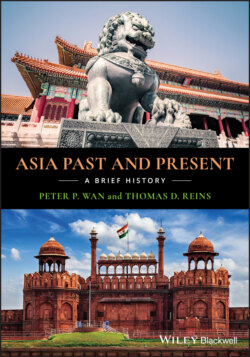Читать книгу Asia Past and Present - Peter P. Wan - Страница 54
The “Golden Age” of Classical Chinese Poetry
ОглавлениеEarly Tang emperors were men full of confidence, which allowed them to view cultural diversity with tolerance. They did not persecute men for what they said or wrote, as did Qin Shihuang in his “literary inquisitions.” Instead, they patronized the arts and encouraged exchanges between Tang China and its neighbors. This social‐political environment ushered in the “Golden Age” of Chinese classical poetry, and produced some of China’s all‐time great poets. Even to this day, ordinary Chinese in their everyday life read and quote their favorite Tang poets.
Imperial examinations required the candidates to write poetry. The belief was that their poetry, as well as their handwriting, not only demonstrated their scholarship but also revealed their personal character. This made poetry writing a required course in one’s education. Soon every educated man could write poetry. And poetry soon took on a wide range of social functions as well: One would write a poem to mark a special occasion (such as a birthday, wedding, or funeral), to communicate with a friend, to seek the audience of an official, to praise the emperor or the gods and spirits, or as a personal pastime. In some cases, an emperor who was a poet himself would influence social taste by raising the social status of literary men.
China’s three all‐time best‐loved poets appeared in the Tang Dynasty.
Li Bai (701–762) was inspired by Daoism. His poems are free in spirit and dazzlingly colorful and flamboyant. They display a strong sense of individual autonomy expressed in a romantic style that is rich in imagery and imagination. He socialized with people of outstanding talent and status, but never rose in social status because of his idiosyncrasies. He refused to conform to norms of social behavior and indulged in long and heavy bouts of drinking. He is known as the “Poet Immortal.”
Du Fu (712–770), unlike the free‐spirited Li Bai, was imbued in the Confucian teachings of loyalty to the emperor and compassion for the common people. That made him self‐effacing. Most of his poems came at a time when Tang China was falling from the “Golden Age” and into a stage of decline and disintegration. The tensions between his lofty Confucian idealism and the abysmal reality before his eyes define the somber and heavy tone of his poetry. His poems conform impeccably to the strictest formal requirements of classical poetry. His great poetry never brought him worldly gain, and he spent his whole life as a petty government official. He is known as the “Poet Sage.”
Bai Juyi (772–846) was an exceptionally successful scholar‐official. Some of his poems, like Du Fu’s, express a deep sympathy for the plight of the common people. But his most memorable works are two romantic ballads: one about the unfulfilled love of an emperor, and the other about the quiet despair of a scholar‐official in exile. He is famed for writing in a colloquial style that is so simple and plain that even an uneducated old woman can appreciate them.
